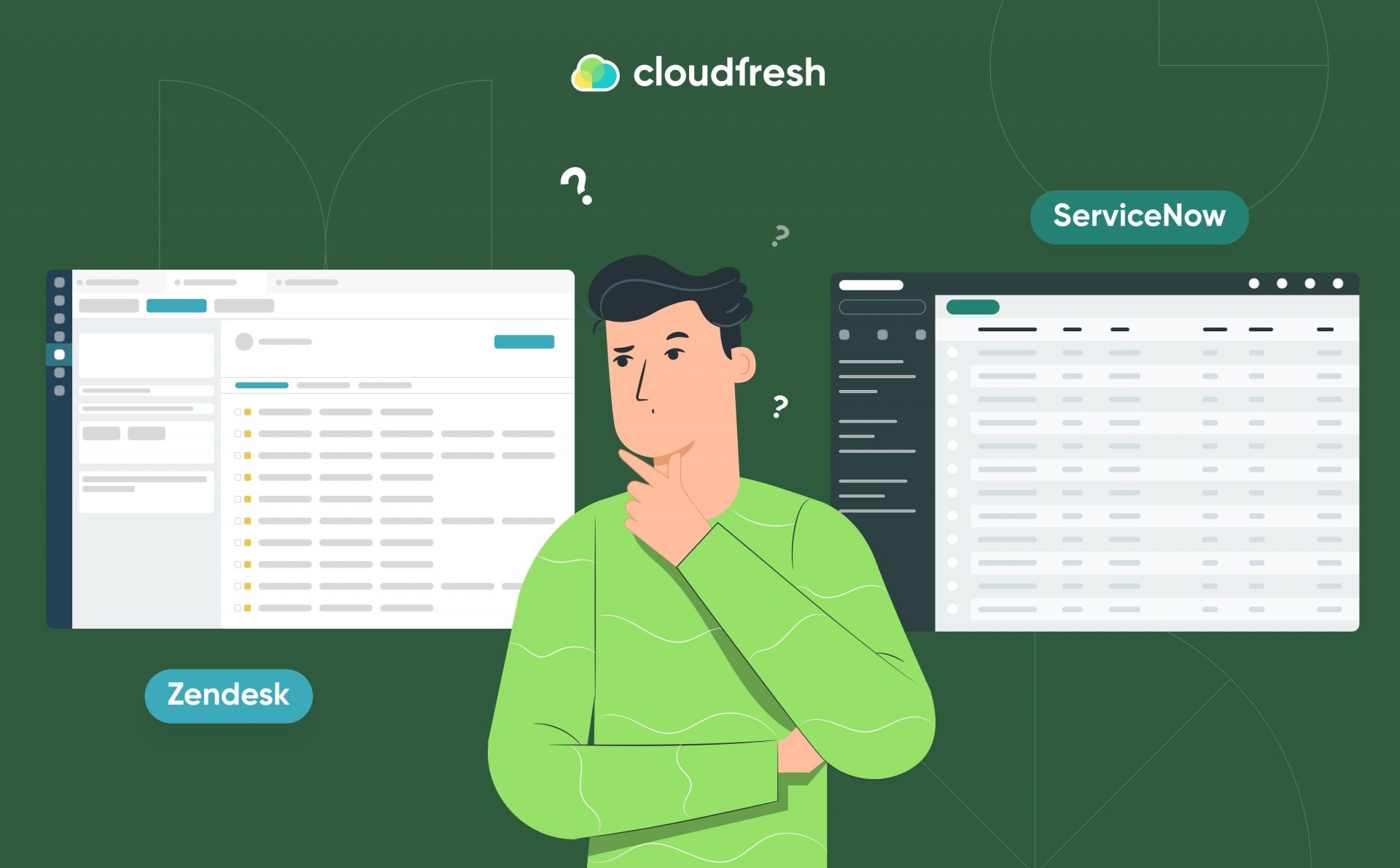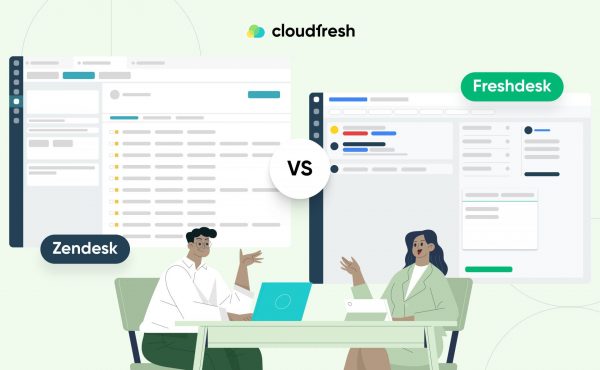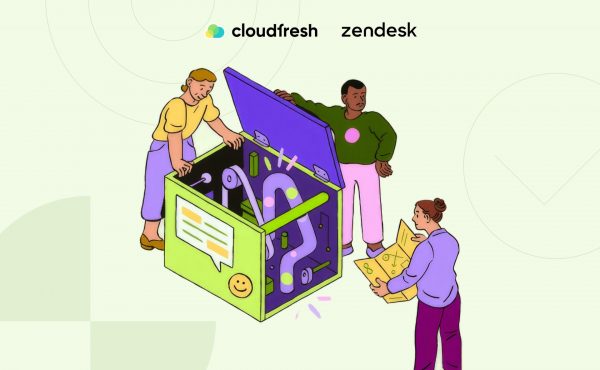Zendesk vs Salesforce: Which Fits Your Organization best?
Zendesk vs ServiceNow – The Ultimate Comparison Guide
- Introduction
- What is Help Desk Software?
- Zendesk vs ServiceNow – General Introduction
- ServiceNow vs Zendesk – an Overview of Core Features

- Pricing Plans – Zendesk and ServiceNow Comparison
- Zendesk vs ServiceNow: Pros and Cons
- Optimize Your Customer Service with the Right Tool

Are you seeking a powerful help desk solution to elevate your elevate your customers’ experience? Nowadays, this kind of cloud-based software has evolved significantly. It offers rich customer-service features and may even include an IT Service Management (ITSM) component.
Many help desk platforms stand out with their extensive arrays of workflow management, ticketing systems, and user experience modules. How to choose the right one? To simplify the choice, this article offers a detailed comparison of the two top solutions – ServiceNow vs Zendesk.
What is Help Desk Software?
Help desk software is a digital tool or platform designed to help businesses manage and organize customer questions and technical issues. It is like a digital office where customer service teams can keep track of problems and help people without delay. Imagine a system that collects emails, website requests, and even social media messages into one organized platform. Here, these requests are converted into so-called tickets and assigned to specific support agents based on their expertise.
Help desk software is more than just ticketing. Many solutions offer a knowledge base—a searchable library of articles and FAQs that empowers customers to find solutions independently. Automation is another key feature that allows for automatic responses, smart ticket routing, and even escalation to managers if issues are not resolved. Reporting and analytics help businesses track metrics like response times and customer satisfaction and refine support strategies. In short, help desk software keeps your customer support operation organized and efficient.
Zendesk vs ServiceNow – general introduction
It’s a common concern when it comes to choosing a help desk software. Zendesk and ServiceNow are indisputable industry leaders. What differentiates these solutions from each other, and which one stands out? Let’s take a closer look at each option.
About Zendesk
Zendesk emerged in 2007 in Copenhagen, Denmark. It’s a cloud-based software solution with an intuitive ticketing system designed to innovate customer service. Zendesk allows businesses to manage customer interactions across multiple channels. It offers features such as ticket management, live chat, and a self-service knowledge base.
Today, it has over 100,000 customers in 160 countries and a valuation of $9.62 billion. The numbers prove that Zendesk is a major player in the customer service software market.
About ServiceNow
ServiceNow’s story began in 2004 in San Diego. Unlike Zendesk’s initial focus on startups, ServiceNow represented a cloud-based ITSM platform for larger enterprises. The idea was to automate IT workflows and centralize processes. The solution gained momentum, attracting major corporations that wanted to improve IT service efficiency. Today, ServiceNow’s valuation is $144.64 billion. It boasts strong market demand – more than 26,000 big enterprises use the platform.
ServiceNow vs Zendesk – an overview of core features
Both ServiceNow and Zendesk offer service tools for customers and employees, but their functionalities still differ. Let’s examine the core features of both solutions to understand which one can be better for your needs. These powerful platforms have enough similar features.
Ticketing system
Both ServiceNow and Zendesk offer ticketing systems, the backbone of any service management platform. However, these systems serve different needs. Zendesk supports multiple channels. Tickets can be created through email, phone calls, web forms, and even social media. ServiceNow offers a wider range of ticket types, but is dedicated to specific IT service management needs.
What’s different?
| Zendesk | Zendesk | ServiceNow |
| Focus | Customer support | Internal IT Service Management (ITSM) |
| Ticket types | Single, general ticket type | Incident, problem, change, etc. |
| Multi-channel support | Supports various channels (email, phone, etc.) | Limited, may require integrations |
| Automation | Focuses on agent productivity | Focuses on workflow automation for ITSM processes |

Knowledge base
Many users appreciate the possibility of resolving issues without contacting the support service team. Both platforms offer a searchable repository of articles, FAQs, and troubleshooting guides. Users can use this information to find answers to common questions and potentially solve any issues without support agents.
Zendesk’s straightforward content management is ideal for dynamic customer service environments. ServiceNow’s advanced features, like role-based access and automated knowledge creation, are more appropriate for large enterprises.
What’s different?
| Feature | Zendesk | ServiceNow |
| Target audience | Customers seeking self-service | Internal IT Staff |
| Content focus | Easy-to-understand troubleshooting guides | Technical IT documentation |
| Visual aids | Clear and concise | Less common, require IT skills |
Reporting and analytics
Both platforms provide reporting and analytics tools. These tools allow you to track vital metrics like response times, resolution rates, and customer satisfaction. This data helps organizations identify areas for improvement and optimize their support operations. Zendesk’s analytics are more focused on customer support and service desk operations. It is ideal for companies looking to improve customer service efficiency and satisfaction. In contrast, ServiceNow’s analytics cover a broader range of enterprise workflows, including IT service management, HR, and other operations.
What’s different?
| Feature | Zendesk | ServiceNow |
| Focus | Customer satisfaction, agent performance | Incident resolution, service uptime, cost analysis |
| Metrics | CSAT, First contact resolution, multi-channel | Incident resolution time, SLA adherence, Asset Uptime |
| Target audience | Customer support teams | IT operational teams |
Integrations
The ability to integrate with other business tools is a must-have feature of modern service management software. Both Zendesk and ServiceNow offer some level of integration capabilities. Zendesk can be synced with various third-party tools and platforms: CRMs, chatbots, social media platforms, and productivity tools. Zendesk offers over 1,300 pre-built, customer service-based apps in the Zendesk Marketplace
ServiceNow offers integrations with a more targeted selection of enterprise systems. These integrations prioritize connecting with tools commonly used in large organizations, particularly those related to IT infrastructure. The ServiceNow Store contains about 250 apps.
What’s different?
| Feature | Zendesk | ServiceNow |
| Focus | Wide range of out-of-the-box integrations | Targeted integrations for enterprise systems |
| Target audience | Businesses of all sizes | Large enterprises with complex IT needs |
| Ease of use | User-friendly setup | Requires technical expertise |
<h3″ id=”automation”>Automation and workflow management
Both Zendesk and ServiceNow offer functionalities to automate tasks and streamline workflows. Zendesk automates repetitive tasks based on pre-defined triggers (e.g., ticket creation, status change) and actions (e.g., automatic notifications, assigning tickets). ServiceNow uses more complex triggers and streamlines tasks across different IT systems for a unified and efficient service delivery flow.
What’s different?
| Feature | Zendesk | ServiceNow |
| Focus | Streamlines agent workflows | Automates entire ITSM workflows |
| Strengths | Agent productivity boosters (macros, routing) | Advanced automation for complex ITSM processes (incident, change, asset management) |
| Weaknesses | Limited for complex workflows | Requires technical expertise to set up and manage |
| Ease of use | User-friendly, minimal technical knowledge needed | A steeper learning curve, potentially needs IT specialists |
<h3″ id=”customization”>Customization
Both Zendesk and ServiceNow allow the creation of custom forms and fields to capture relevant workflow information. They support the customization of branding elements to strengthen a company’s visual identity. Additionally, both platforms offer robust APIs and integrations to extend their capabilities.
What’s different?
| Feature | Zendesk | ServiceNow |
| Focus | User-friendly, customer support-oriented User-friendly, customer support-oriented | Deep customization, complex needs |
| Level | Moderate | High |
| Ease of use | Minimal technical expertise needed | Requires programming knowledge |
| Customization options | Theme editor (UI colors, logos); Custom fields and workflows; App Marketplace (pre-built integrations) | Scripting and development (JavaScript, Glide); Form and report builder; Plugin development (custom or pre-built) |
Pricing Plans – Zendesk and ServiceNow Comparison
Both Zendesk and ServiceNow offer many similar features, but their pricing structures differ significantly. Here is a breakdown to help you choose the one that best fits your budget.
Zendesk Pricing
Zendesk has a tiered pricing model with several plans for different business needs:
- Demo version. Zendesk does not offer a free plan, but you can test the platform in a demo mode.
- Support Team. $19 per agent per month.
- Support Professional. $55 per agent per month.
- Support Enterprise. $115 per agent per month.
- Suite Team. $55 per agent per month.
- Suite Growth. $89 per agent per month.
- Suite Professional. $115 per agent per month.
- Suite Enterprise. Contact Sales for custom pricing.
ServiceNow Pricing Policy
While wondering how much does ServiceNow cost, it’s important to understand that ServiceNow has a unique pricing approach and doesn’t use standard pricing models. Instead, every pricing plan is negotiated individually with each client. Furthermore, the company asks clients to sign a strict non-disclosure agreement regarding pricing details to maintain confidentiality throughout the negotiation process.
What is the right option?
Zendesk is a great choice for budget-minded startups and small businesses thanks to its transparent pricing policy. ServiceNow is relevant for large organizations with a significant IT infrastructure and a need for advanced features.
Zendesk vs ServiceNow: Pros and Cons
To wrap things up, here’s a look at the pros and cons of both Zendesk and ServiceNow.
Zendesk is a user-friendly option with multi-channel support and a helpful knowledge base. It’s great for small and medium businesses due to its transparent pricing and ease of use. While it might lack some advanced features for large enterprises, its simplicity and quick implementation make it a versatile choice.
ServiceNow, on the other hand, offers a comprehensive IT Service Management suite with workflow automation, advanced reporting, and asset management. It’s ideal for large enterprises with complex IT needs but comes with a higher price tag and requires significant IT expertise to implement. Despite its powerful features, it may be too complex for smaller businesses.
In summary, Zendesk’s ease of use and affordability make it accessible for a wide range of businesses, while ServiceNow’s advanced capabilities are better suited for larger organizations with specific IT requirements. For many, Zendesk offers the right balance of functionality and simplicity.
Optimize Your Customer Service with the Right Tool
So, what’s the verdict? The key point is to understand that you are not picking a winner but selecting the right tool for your business. Still, it is vital to know the difference.
Need a robust ITSM tool for large enterprises with complex needs? ServiceNow excels with its comprehensive suite. If you are a budget-conscious startup or a business that prioritizes user-friendly customer support, consider Zendesk, as the best ServiceNow competitor. Its clear pricing and ease of use make it a great fit for businesses of all sizes. And don’t hesitate to seek guidance to ensure a smooth and successful setup.
As a Zendesk Premier Partner, we specialize in optimizing and implementing key Zendesk products: Support, Sales, Sunshine, and integrations. Our goal is to ensure your customer service ecosystem is both proactive and tailored to your specific business requirements. That’s why we offer Zendesk Professional Services, covering implementation, audit and consulting, integration development, basic feature setup, and training sessions.
Additionally, we provide a service package that helps train your team on using AI and chatbot solutions to enhance your customer support—it’s a must-have nowadays!
Are you ready to give it a try? Reach out to us to learn more.















